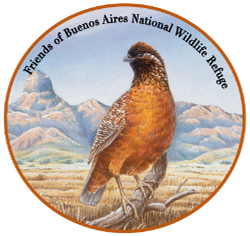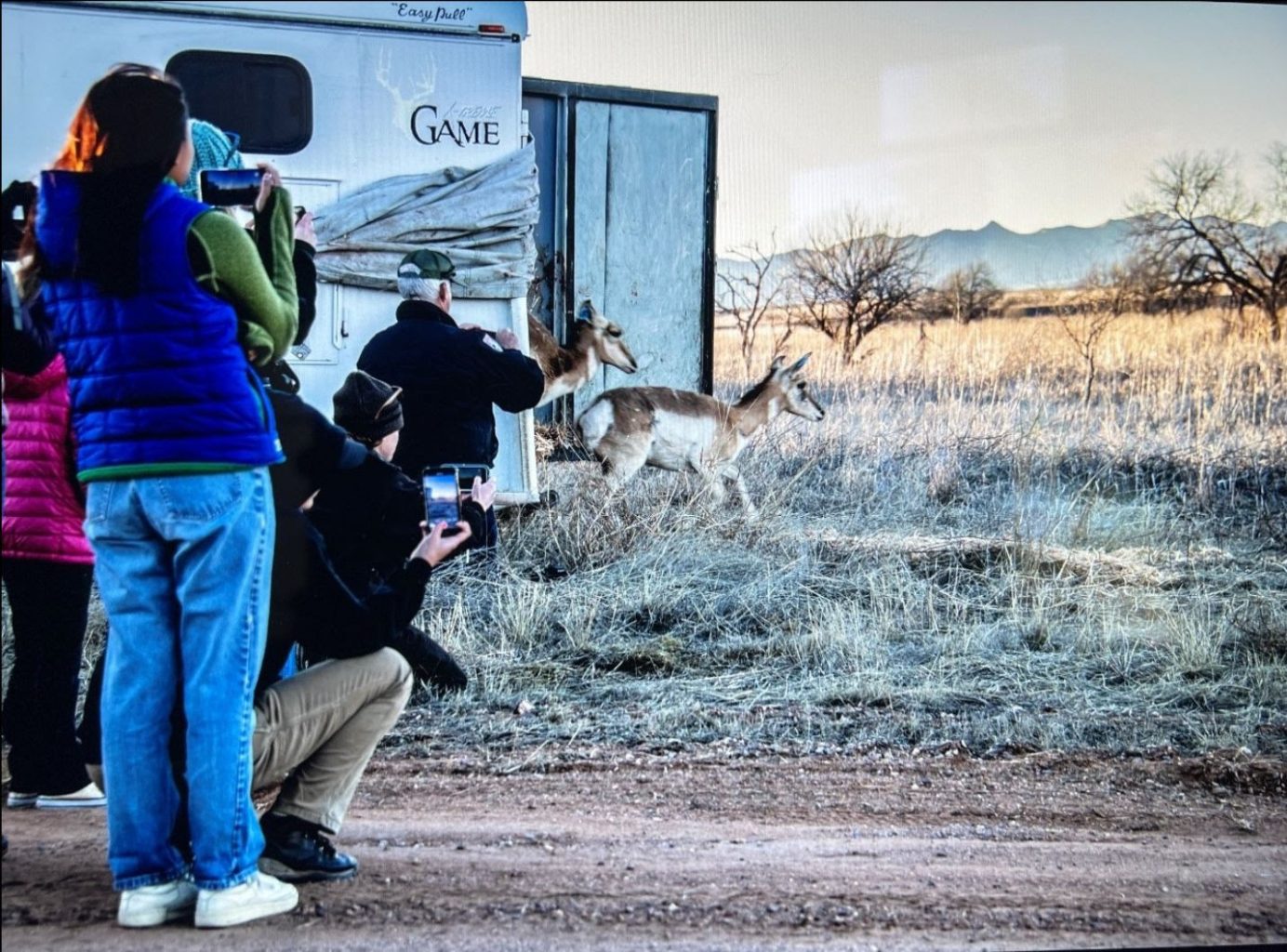
Friends of Buenos Aires National Wildlife Refuge – Annual Report – 2023
The Friends of Buenos Aires National Wildlife Refuge continue to provide valuable assistance to the Refuge. These efforts cover a broad spectrum of projects that help wildlife and improve habitat, or improve and repair public use infrastructure such as signs, trails, and the Cienega boardwalk. Other endeavors provide education programs for the public, either on the refuge or in nearby communities. The Friends provide their own volunteer labor for these projects, or coordinate visiting volunteer work groups. The Friends group also secures grant money to purchase supplies for field projects or to hire contractors to help in that effort.
The National Wildlife Refuge System is part of the U.S. Fish and Wildlife Service. The USFWS is not allocated sufficient funding to adequately fulfill their mission of protecting the nation’s wildlife and providing opportunities for visitors. The shortfall in funding also leads to insufficient staff numbers. In light of these difficulties, the role of the Friends is increasingly important in assisting the Refuge to carry out its role.
You are helping in this effort through your membership in the Friends of Buenos Aires. If you are not already a member of the Friends of Buenos Aires NWR, now would be a great time to join!
Nature Shop and Money Matters

The Visitor Center at Refuge Headquarters is staffed by local and seasonal volunteers who greet visitors, answer questions, provide literature and refuge maps, and manage sales of caps, pins, t-shirts, all of which sport a wildlife theme. Sales in the gift shop at the Visitor Center increased in 2023 compared to the previous year. This can be largely attributed to the fact that the Visitor Center was closed much of the time during the Covid pandemic (year 2021 below).
Nature Shop sales are increasing and have now exceeded the pre-covid level (2019). Gross sales do not include the wholesale cost of merchandise. The last three years of total sales are:
2021: $2,714
2022: $4,142
2023: $8,568
The following chart summarizes fiscal activity in 2023. Income is from membership dues, donations, grants and Nature Shop sales. Expenses include purchases for Nature Shop inventory, supplies for awarded grant projects and other field work, outreach and education, and insurance. In 2023 substantial start-up costs took place to plan and carry out the Friends fundraiser.

Luncheon and Fundraiser
On January 21, 2023, the Friends of Buenos Aires hosted their first-ever fundraising effort. It was a grand success! Located at the newly refurbished Dance Hall in Arivaca, the event had a capacity of 65 and tickets sold out ahead of the event. The silent auction showcased more than thirty nature-related items, ranging from wildlife art prints to bird photographs to overnight lodging packages and guided birdwatching outings. The hall was beautifully decorated by the Friends members, including draped tables with centerpieces. During the catered luncheon, a backdrop of recorded instrumental music provided ambience, along with a projected slide show of beautiful images of the Refuge’s landscape and wildlife. After lunch, author and naturalist Pinau Merlin presented a fascinating keynote address entitled “Reading Nature’s Clues.” She provided insights about understanding the “signs” that wildlife leave in nature.
As a result of this successful occasion, the Friends of Buenos Aires gained several new memberships, and several current members increased their donation category. Memberships, donations, and silent auction proceeds will be used to fund projects that help the refuge fulfill its mission of benefiting wildlife, their habitat, or visitor use and education.
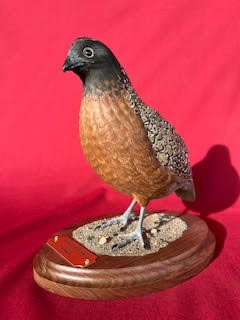
Masked Bobwhite
This beautiful wood carving was a special showcase item in the silent auction. It was created by an award-winning bird carver and is likely the first carving that has been rendered of the masked bobwhite.
Volunteers
In the year 2023, the Refuge received a whopping total of 2,249 hours of volunteer work supplied by local volunteers or visiting work groups. The total number of volunteer hours is actually higher because this first figure does not include volunteers who staff the Visitor Center or the seasonal volunteers – those that drive from far-flung states to spend the fall and winter months working for the refuge.
These dedicated workers donated their efforts to several projects last year:
Fence Removal
When the refuge was acquired in 1985, it was crisscrossed by more than 200 miles of barbed wire fence, left over from when this area was Buenos Aires Ranch. Tireless efforts, entirely by volunteers, have removed 90 percent of the fencing. This is a benefit for wildlife as the range becomes more open and unfettered, allowing movement of deer and pronghorn. Otherwise, these barriers can impede wildlife movement across the landscape. Barbed wire may snag animals, especially pronghorns, which evolved in open country and more often attempt to go under or through a fence rather than jumping it as deer do. Another fence improvement is modifying the fence to make it “wildlife friendly.” The top wire is lower and barbless, and the bottom wire is a minimum of 18 inches above the ground, allowing pronghorns to crawl under it.
In November 2023 fourteen Wilderness Volunteers took down 7400 feet of fence in two remote areas. On the south end of the refuge, 5800 hundred feet were removed. In Brown Canyon 1600 feet was taken down on a steep and difficult slope. Tracks showed that javelina had crawled under this barbed fence, but that barrier is now completely removed. From January 30 to February 3, Four Wheel Campers and Sierra Club volunteers converted 2.2 miles of barbed fence to wildlife friendly fence along highway 286, in an area where pronghorn have been crossing. Passage is now safer for both pronghorns and deer. The Friends hired a contractor for one day to lead and train the workers, and volunteers worked alongside staff from the Arizona Game and Fish Department during the field project.
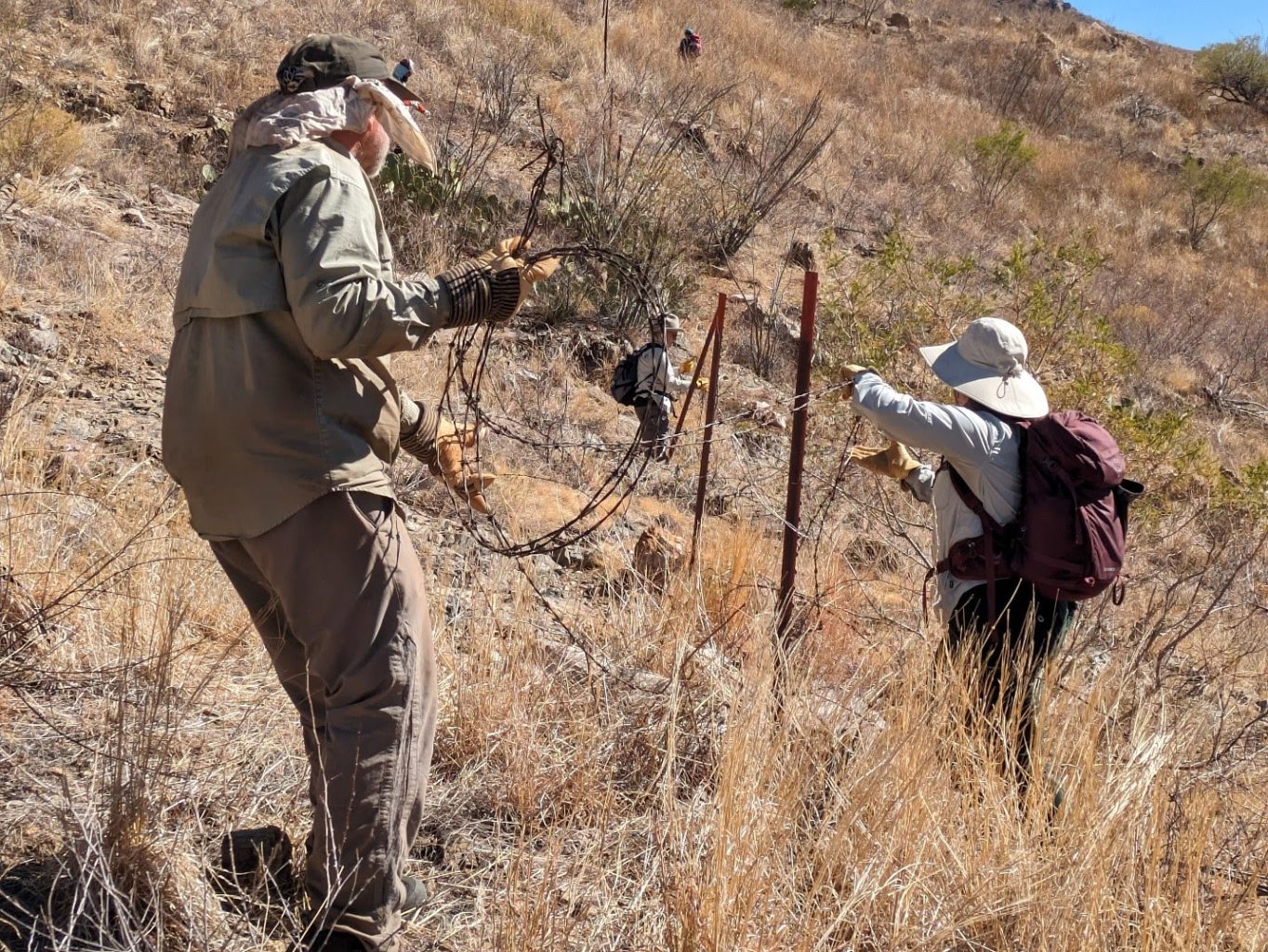

Pronghorn Reintroduction
The Game and Fish Department coordinated a translocation of 30 pronghorns in January of 2023. The animals were captured and removed from a population in north-central Arizona, where they are losing habitat to urban development. The transplanted pronghorns will hopefully benefit from the open country and reduced fencing at Buenos Aires NWR, fencing that volunteers have worked hard to remove over many years.

Erosion Control
Seasonal rain and runoff can erode trails and washes. Erosion can also result from human foot traffic, whether it is hikers or undocumented immigrants. In March a group of wilderness Volunteers led by Maintenance Chief Devon improved footpaths that had badly eroded on the Arivaca Creek Trail. Steepness of the trails contributed to the erosion, so workers installed log treads crosswise on sections of the trail to retard erosion and improve footing at the same time. They also built two ramadas to provide shelter for picnic tables and visitors and another at the Aguirre Lake parking area.
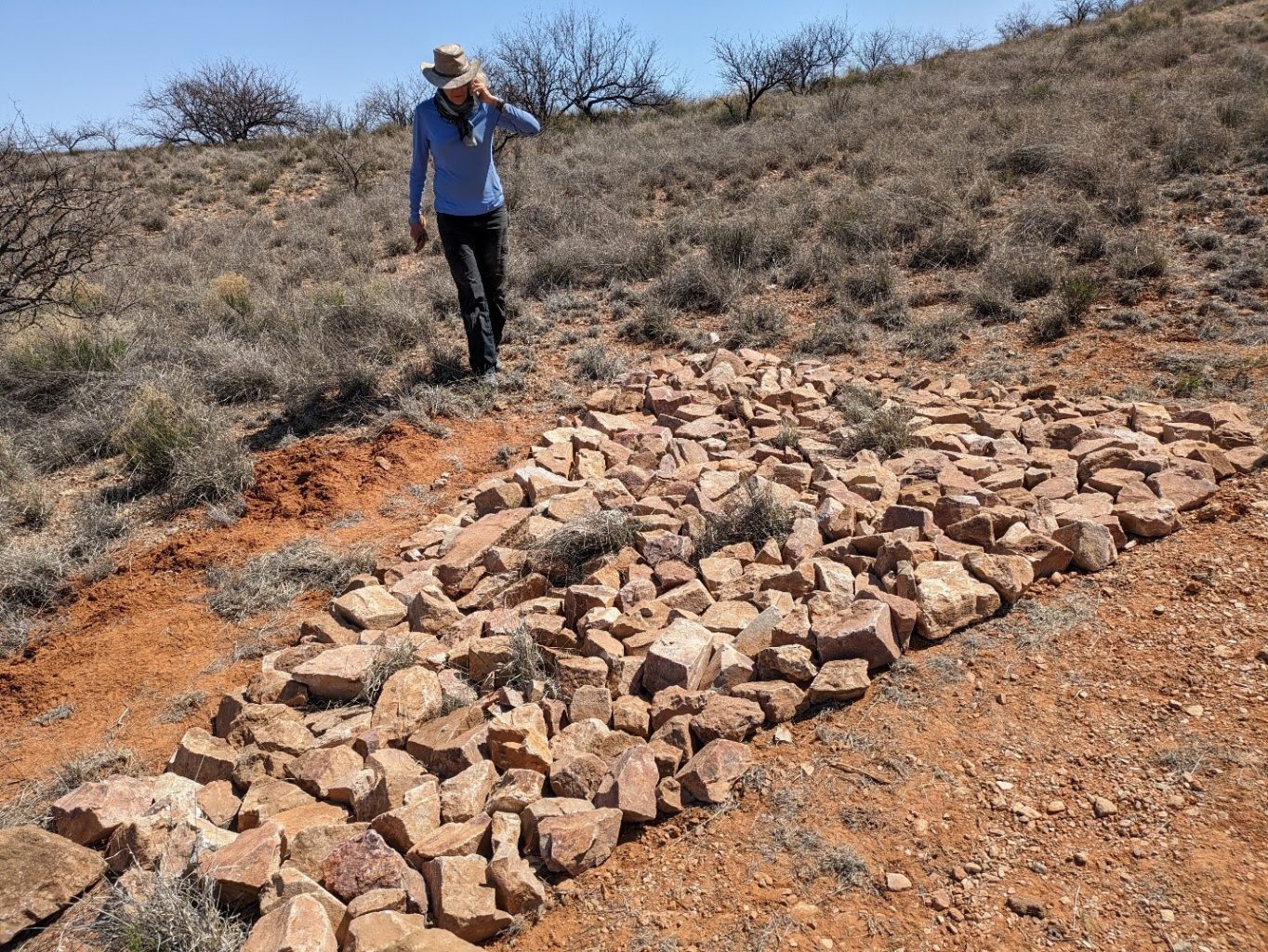
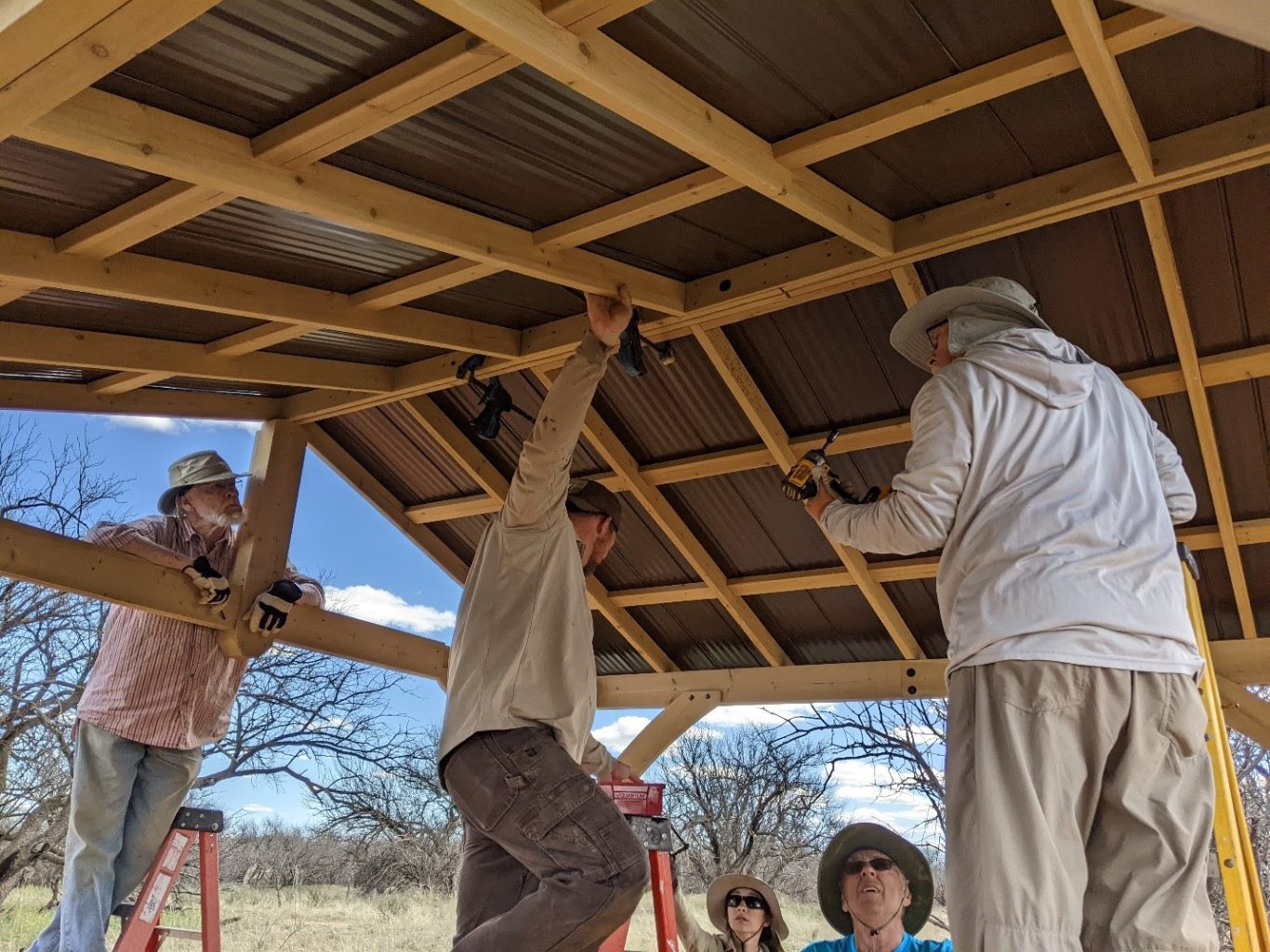
Environmental Education
The Friends of Buenos Aires arranged for four environmental education programs in Arivaca in the winter of 2023-24. An informative talk about Arizona snakes took place in December, to be followed by a January presentation by Sky Island Alliance and later programs by naturalist Vincent Pinto and by the Altar Valley Conservation Alliance. Through these free public events, attendees gain insights into nature and acquire information that enhances their outdoor experiences.
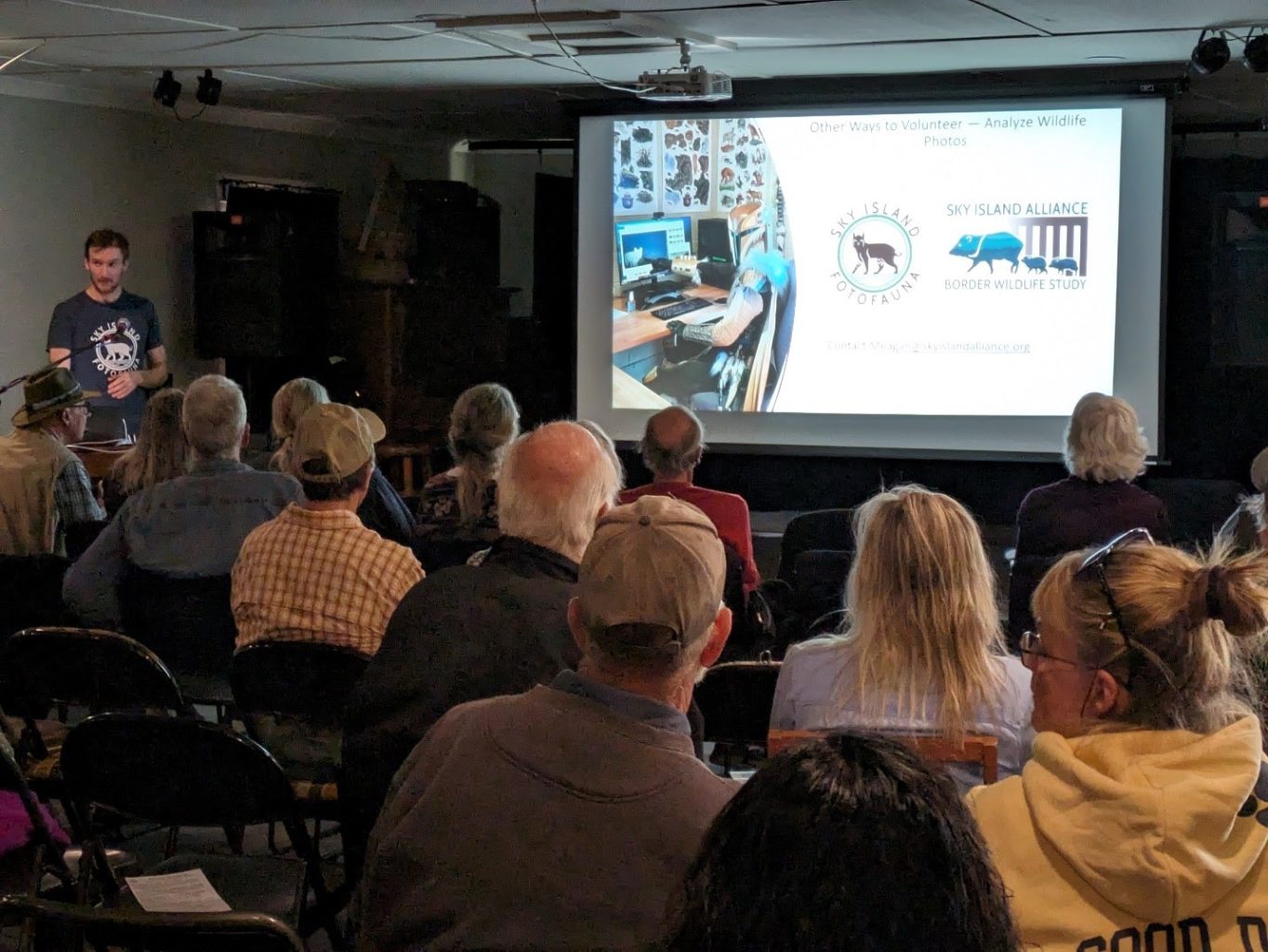
If you have not renewed your membership or joined Friends, here’s how you can do it.
Joining the Friends is a great way to help wildlife and habitat!
Categories of membership are:
Gila Monster $25
Jackrabbit $50
Jaguar $100
Pronghorn $500
Masked Bobwhite, lifetime membership $1000
To join, you may send a check, payable to Friends of BANWR to:
Friends of BANWR
PO Box 81
Green Valley, AZ 85622
OR,
You may go to our website https://friendsofbanwr.com and pay through PayPal.
Thank you!
Bonnie Swarbrick
President, Friends of BANWR
